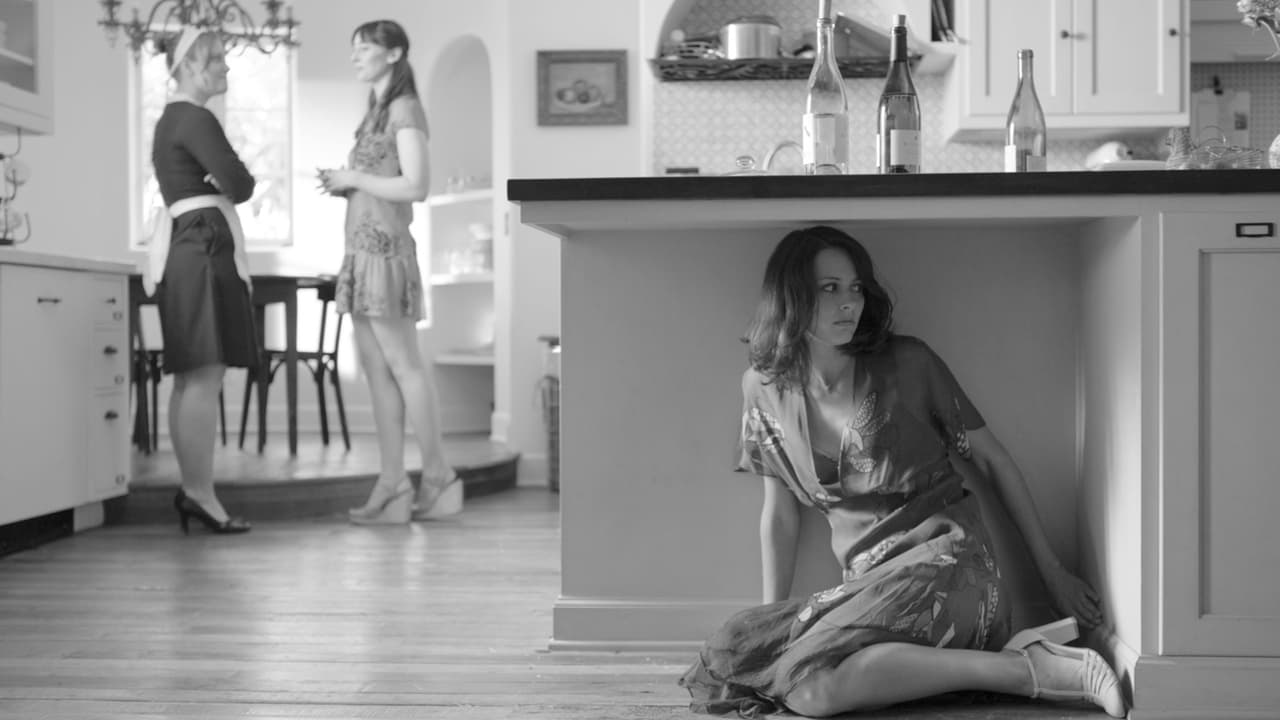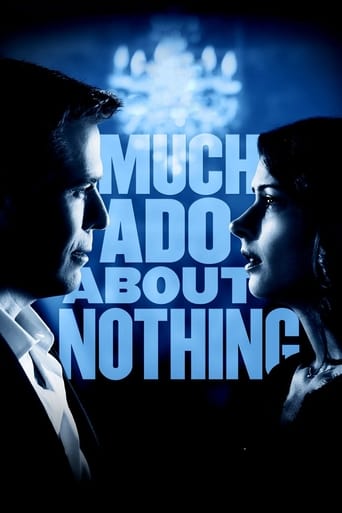

One of my all time favorites.
... View MoreSimple and well acted, it has tension enough to knot the stomach.
... View MoreThe film never slows down or bores, plunging from one harrowing sequence to the next.
... View MoreThe movie is wonderful and true, an act of love in all its contradictions and complexity
... View MoreUpdated to modern times but with all of Shakespeare's archaic (if poetic) dialogue intact, Joss Whedon's 'Much Ado About Nothing' is one of the strangest big screen Shakespeare adaptations to date. The film innovatively adds cars and iPhones to the tale, however, with dialogue and characters that differ so little from the way Shakespeare wrote them, the novelty value dries up rather quickly and what else the film has to offer is debatable. The black and white photography is sumptuous, but it does not exactly add a lot to the tale and the performances are hardly spectacular. Whedon does include some unique comedy touches of his own though; not all of them work (a pratfall down the stairs) but Alexis Denisof as Benedick showing off by doing one-armed push-ups and muscles flexes works well as a humorous extension of the character's sheer arrogance. There are also some subtle funny moments to be had in characters sprouting Shakespearean dialogue while sitting next to dollhouses and calling each other by titles such as 'prince' to adhere to the Bard's original dialogue. For a daringly different take on Shakespeare, the film is worth a look. One's mileage may vary though depending on how familiar one is with the source material and how much humour one finds the notion of modern day folks talking as if they are stuck in the sixteenth century.
... View MoreTo modernize Shakespeare is not always the best guarantee the depth of such a light comedy will be kept and even amplified. In this case the set is a real labyrinth, house and gardens, and we are sort of lost in all these corridors and rooms, bedrooms, kitchen, living rooms that are constantly, on all sides communicating, making any privacy impossible. But we get used to it.The plot is more or less kept but princes, lords, counts and other noble people in modern garb in the modern world with cars and mammoth fridges and all modern comfort and commodities sound slightly folkloric. But here too we get used to it.That was a comedy and still is, especially since the private cops are pathetic when they protest because they are called asses, which is not really an insult since they are nothing but mules for their princes and other noble people. But what about the rest of the plot?Two young women. One wants to get married with a young man who at first is quite willing but some slandering goes on and the young man accuses the young woman of not being a maid any more. Love goes along with a lot of pain, as is well known. So she is announced as being dead after fainting in that tense situation, with the complicity of the local priest who was supposed to perform the wedding ceremony. We already know about that since we all know Romeo and Juliet. But it is a comedy. So everything will have to find some epiphany.The second young woman is in love with a certain Benedict. But Benedict has sworn he will never marry, though that woman attracts him because she professes the idea that she will never marry. Never attracts never and two negatives make a positive. This young woman is the cousin of the first one and Benedict is intelligent enough to swear he is going to accuse and confront the man who she was to marry and who accused her falsely. But no duel will take place because in the meantime the private security mules have been able to discover the plot and to arrest a couple who had been paid to spread the slandering rumor. So everything will end up well and they will be happy ever after. And two weddings in one day! Isn't that an achievement?One of these comedies Shakespeare loved though the modern rewriting and shortening or densifying makes it a little bit easy, light, rather simple in a way. Apart from that lightness it is brilliantly set and performed though maybe slightly stiff as for the main Lord and clownish as for the private security asses. I must say too that the black and white made it nicely archaic and retrospective. Does the black and white add anything to the play? I am not sure but we get used to it.But what is missing will you ask? Just the magic of the Renaissance, the distance in time that is not visible, hence we feel the stiffness of the nobility too much, especially when some are courting the maids, which is not courting but rather philandering. It sounds like "A Sentimental Journey" by Laurence Sterne. Slightly anachronistic. Dr Jacques COULARDEAU
... View MoreNormally, when I watch a film done in the Shakespearean prose, even a film that turns out to be a full-bloodied masterpiece like Orson Welles' Othello or Kenneth Branaugh's Hamlet, there is a sense that the language doesn't sound ALL immediate. It's all performed well and with enough energy and dramatic guff, but I don't get a modern sensibility from the actors.Joss Whedon, for the first time that I could see in a *good* way (step aside, Baz Lurhmann with your '+' film), got performances that spoke on film the Bard's words and yet ALSO provided, at least for me, a view into how to speak such words in a way that feels immediate, real, and not drawn out from the past but just as *there* in the sense of character interactions, timing and comic/dramatic sensibility as on Buffy or Angel or anything else Whedon does.It's really, I think, about how he directs the actors, and it's what counts here when it's a micro-budget film (Whedon shot it as his "20th anniversary present" to himself, no, really, following his wrap on shooting The Avengers in 2011), and all that's there is the actors in a house and it's black and white footage. And Whedon gets this story down so convincingly because his cast is always on top of what needs to be said, what's there in-between in physical actions (as Alexis Denisof tries to listen in any way he can to romance talk about another 'lady' and his interest, played by the sweetheart Amy Acker).And again, Nathan Fillion, how you fill in a supporting role! The Dogberry stuff is the "B"-plot-line, but it adds so much comedic punch to the narrative,which is all based on behavior and nuance by the way, and attitudes towards love, commitment, and how we treat one another as ruthless or kind or sometimes (trying) to do both in the same scene. Sound like classic Whedon, with the whole ensemble and sly romantic entanglements with the touch of social satire? You bet. It was my pick for Sleeper of the summer 2013.
... View MoreOK, using "Shadow" in the title is a poor attempt at a pun over the use of black/white film... Which never works because there's never enough contrast. There is no Black, there is no White... It's tedious Grey, start to finish. Comparing this to the 1990's version is completely unfair, as in spite of 20 years of technological upgrades, the "original" sounds, looks and just feels better. This is using a TV-actor cast, and it unfortunately shows, as it's just wooden. The charm, banter and wit of the original (movie or story) is completely lost because nobody looks like they are actually enjoying themselves - making for a very strange "comedy".I had to watch the Thompson/Branagh version as soon as I finished with this, just to get the poor taste out of my head - and I'm glad I did.
... View More